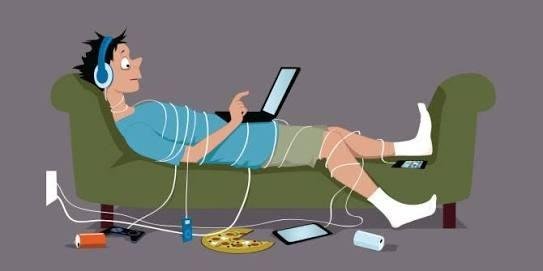ATTRACTIVE DISTRACTIONS! COMMON PROBLEMS OF ADDICTION.
Addiction is a condition in which a person engages in use of a substance or in a behavior for which the rewarding effects provide a compelling incentive to repeatedly pursue the behavior despite detrimental consequences. Addiction may involve the use of substances such as alcohol, inhalants, opioids, cocaine, nicotine, and others, or behaviors such as gambling; there is scientific evidence that the addictive substances and behaviors share a key neurobiological feature—they intensely activate brain pathways of reward and reinforcement, many of which involve the neurotransmitter dopamine.
Both substance use disorders and gambling behaviors have an increased likelihood of being accompanied by mental health conditions such as depression and anxiety or other pre-existing problems. Substance use and gambling disorders not only engage many of the same brain mechanisms of compulsivity, they respond to many of the same approaches to treatment.
Complex conditions that affect reward, reinforcement, motivation, and memorysystems of the brain, substance use and gambling disorders are characterized by impaired control over usage; social impairment, involving disruption of everyday activities and relationships; and may involve craving. Continuing use is typically harmful to relationships and work or school obligations. Another distinguishing feature is that individuals may continue the activity despite physical or psychological harm incurred or exacerbated by use. And typically, tolerance to the substance increases, as the body adapts to its presence.
Although all addictions have the capacity to induce a sense of hopelessness and feelings of failure, as well as shame and guilt, research documents that recovery is the rule rather than the exception, and that there are many routes to recovery. Individuals can achieve improved physical, psychological, and social functioning on their own—so-called natural recovery. Others prefer the support of community or peer-based networks. Still others opt for clinical-based recovery through the services of credentialed professionals
Because addiction affects the brain’s executive functions, individuals who develop an addiction may not be aware that their behavior is causing problems for themselves and others. Over time, pursuit of the pleasurable effects of the substance or behavior may dominate an individual’s activities.
People with an addiction do not have control over what they are doing, taking or using. Their addiction may reach a point at which it is harmful.
Addictions do not only include physical things we consume, such as drugs or alcohol, but may include virtually anything, such abstract things as gambling to seemingly harmless products, such as chocolate - in other words, addiction may refer to a substance dependence (e.g. drug addiction) or behavioral addiction (e.g. gambling addiction). 
This article focuses mainly on addiction to physical substances.
In the past, addiction used to refer just to psychoactive substances that cross the blood-brain barrier, temporarily altering the chemical balance of the brain; this would include alcohol, tobacco and some drugs. A considerable number of psychologists, other health care professionals and lay people now insist that psychological dependency, as may be the case with gambling, sex, internet, work, exercise, etc. should also be counted as addictions, because they can also lead to feelings of guilt, shame, hopelessness, despair, failure, rejection, anxiety and/or humiliation.
When a person is addicted to something they cannot control how they use it, and become dependent on it to cope with daily life.
A habit may eventually develop into an addiction
Many of us can use substances or become engaged in activities without any significant problems. Some people, however, may experience damaging psychological and/or physical effects when their habit becomes an addiction. 
ADDICTION AND HABITS.
With a habit you are in control of your choices, with an addiction you are not in control of your choices.
Addiction - there is a psychological/physical component; the person is unable to control the aspects of the addiction without help because of the mental or physical conditions involved.
Habit - it is done by choice. The person with the habit can choose to stop, and will subsequently stop successfully if they want to. The psychological/physical component is not an issue as it is with an addiction.
Addiction to substances or activities can sometimes lead to serious problems at home, work, school and socially. 
MAJOR CAUSES OF ADDICTION.
The causes of addiction vary considerably, and are not often fully understood. They are generally caused by a combination of physical, mental, circumstantial and emotional factors
feel good — feeling of pleasure, “high”
to feel better — e.g., relieve stress
to do better — improve performance
curiosity and peer pressure
MOST COMMON ADDICTIVE HABITS
SEX.
Sex is a normal part of the human experience, and one that modern society now embraces and encourages. Our media is flooded with sexualized images, from advertisements in magazines, billboards, and TV commercials to sexually explicit lyrics and music videos, to sex scenes in television shows and movies.
Sex is not a problem for most people, but it can become an issue for some. The term sexual addiction is frequently used to describe the problem some people have when they act out sexually in ways they feel they cannot control, and which are detrimental to their health and relationships. However, there is no official clinical diagnosis of sex addiction, making consistent identification and treatment of this issue a little murky.
Sexual addiction, also known as sex addiction, is a proposed state characterized by compulsive participation or engagement in sexual activity, particularly sexual intercourse, despite negative consequences.Proponents of a diagnostic model for sexual addiction, as defined here, consider it to be one of several sex-related disorders within an umbrella concept known as hypersexual disorder.The term sexual dependence is also used to refer to people who report being unable to control their sexual urges, behaviors, or thoughts. Related or synonymous models of pathological sexual behavior.
PORNOGRAPHY
Pornography addiction is an addiction model of compulsive sexual activity with concurrent use of pornographic material, despite negative consequences to one's physical, mental, social, or financial well-being.
Problematic internet pornography viewing is viewing of Internet pornography that is problematic for an individual due to personal or social reasons, including excessive time spent viewing pornography instead of interacting with others. Individuals may report depression, social isolation, career loss, decreased productivity, or financial consequences as a result of their excessive Internet pornography viewing impeding on their social life.
@resteemator is a new bot casting votes for its followers. Follow @resteemator and vote this comment to increase your chance to be voted in the future!
Congratulations! This post has been upvoted from the communal account, @minnowsupport, by rheda from the Minnow Support Project. It's a witness project run by aggroed, ausbitbank, teamsteem, theprophet0, someguy123, neoxian, followbtcnews, and netuoso. The goal is to help Steemit grow by supporting Minnows. Please find us at the Peace, Abundance, and Liberty Network (PALnet) Discord Channel. It's a completely public and open space to all members of the Steemit community who voluntarily choose to be there.
If you would like to delegate to the Minnow Support Project you can do so by clicking on the following links: 50SP, 100SP, 250SP, 500SP, 1000SP, 5000SP.
Be sure to leave at least 50SP undelegated on your account.